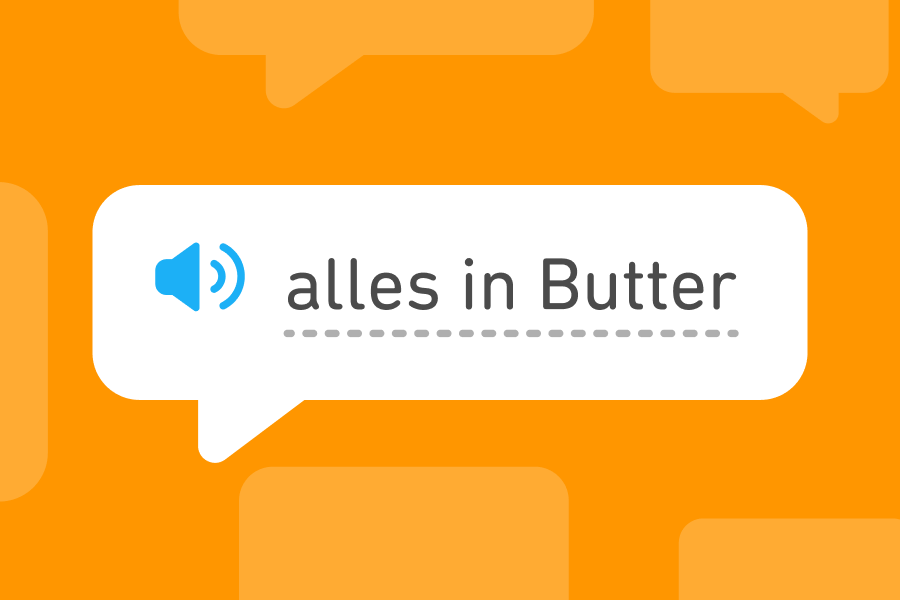Not only does German have some uniquely expressive words, but German idioms also fill everyday needs you didn't even know you had!
Here are a few of the colorful ways German speakers talk about seemingly mundane situations:
einen Korb bekommen
Literal meaning: "to get a basket"
Translation: to be rejected
Tracing back to a custom from the Middle Ages where an actual basket was involved, in today’s German you can—metaphorically—get (bekommen) a basket 😭 or give (geben) one to somebody else. 😬
nur Bahnhof verstehen
Literal meaning: “to only understand train station”
Translation: to not understand anything (like “it’s all Greek to me”)
Saying Ich verstehe nur Bahnhof (I understand only train station) means you don’t understand anything, like, at all. So, if you ever find yourself lost in a sea of German words, just pull out this idiom to throttle down the conversation speed.
am Sankt-Nimmerleins-Tag
Literal meaning: “on Saint Never-lein’s Day”
Translation: never
Got a date on St. Valentine’s Day? Mark February 14th! Seeing friends on St. Patrick’s Day? Party on March 17th! Postponing plans to Sankt-Nimmerleins-Tag? They’re now scheduled for… never. 📅🚫
alles in Butter
Literal meaning: “everything in butter”
Translation: everything’s fine
When saying that everything’s in Butter, German speakers mean to express that things are a-OK—much like food prepared with melt-in-the-mouth butter rather than less tasty alternatives.
eine Schwalbe machen
Literal meaning: “to do a swallow”
Translation: to dive (in the context of soccer)
Soccer players sometimes deliberately let themselves fall. This is a tactical move and the motion can be reminiscent of a slightly less graceful version of the bird Schwalbe (swallow). ⚽🐦
(keinen) Bock haben
Literal meaning: “to have (no) billy goat” 🐐
Translation: to (not) be interested in something
While a Bock can be both an animal (billy goat) or a piece of sports equipment (vaulting horse), if you say that you have Bock auf something, you’re totally up for that thing! Use the negated form keinen Bock to express that you can’t be bothered with something.
ins Fettnäpchen treten
Literal meaning: “to step into the little bowl of fat”
Translation: to put one’s foot into one’s mouth
Legend has it that farmers kept a pot of fat for their boots near the front door. Now, imagine the awkwardness if someone mistakenly stepped into that bowl when entering the house… 🫠
jemandem ein X für ein U vormachen
Literal meaning: “to fool somebody into thinking a U is an X”
Translation: to deceive somebody
In Ancient Rome, V represented “five” and X meant “ten”. Adding two lines under a V could easily double its value, for example, on an unpaid bill. The Latin letter “V” eventually gave us today’s “U”—hence its use in this saying.
lügen wie gedruckt
Literal meaning: “to lie like printed”
Translation: to lie through one’s teeth
The origin of this saying isn’t entirely clear, with some attempts to explain it possibly being lies themselves. Regardless, when someone is lying wie gedruckt, they are telling anything but the truth. 🤥
auf dem Schlauch stehen
Literal meaning: “to stand on the hose”
Translation: to not get it, to be clueless
If someone is standing auf dem Schlauch, their brain just isn’t braining at that moment. It’s like a garden hose that stops working when somebody steps on it—things simply aren’t flowing.
einen Kater haben
Literal meaning: “to have a tomcat”
Translation: to have a hangover
Unfortunately, einen Kater haben isn’t about a furry friend. Perhaps unsurprisingly, it originated from German university students and has also given us the adjective verkatert (hungover).
nicht das Gelbe vom Ei sein
Literal meaning: “to not be the yellow of the egg”
Translation: to not be the best option, to not be perfect
When you eat an egg, the yolk is the most delicious part, right? So, if something isn’t like the yolk, then it just isn’t the best. 🤷
Your German will soon be in butter!
Knowing how to use words figuratively will help you express yourself in German—and help you make sense of the surprising uses you'll hear from German speakers. It’s like zwei Fliegen mit einer Klappe schlagen (hitting two flies with one swatter)!



